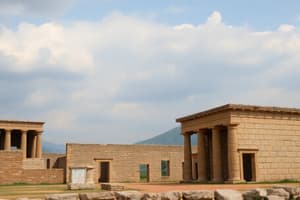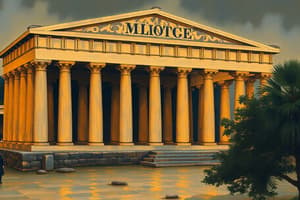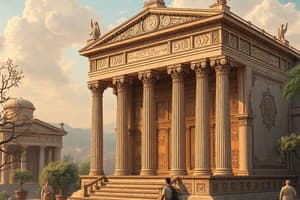Podcast
Questions and Answers
What does the tithe refer to in the context of the Church?
What does the tithe refer to in the context of the Church?
- An offering made during services
- A tax paid each year to the Church (correct)
- A fee for church services
- A donation to the poor
What were the three vows taken by monks and nuns under the Benedictine Rule?
What were the three vows taken by monks and nuns under the Benedictine Rule?
- Obedience, poverty, and chastity (correct)
- Devotion, chastity, and piety
- Obedience, honor, and service
- Faithfulness, humility, and charity
How did monasteries and convents serve their communities?
How did monasteries and convents serve their communities?
- As centers for political gatherings
- By providing basic social services (correct)
- Only as places of worship
- By hosting recreational events
What was a key role of monks and nuns concerning ancient writings?
What was a key role of monks and nuns concerning ancient writings?
What claim did medieval popes make regarding their authority?
What claim did medieval popes make regarding their authority?
What conflict led to the end of Athenian domination in Greece?
What conflict led to the end of Athenian domination in Greece?
Which philosopher is known for his method of seeking truth and self-knowledge?
Which philosopher is known for his method of seeking truth and self-knowledge?
What did Plato establish to teach his philosophical ideas?
What did Plato establish to teach his philosophical ideas?
Which of the following is considered the most famous example of Greek architecture?
Which of the following is considered the most famous example of Greek architecture?
What type of plays did Greek playwrights create that focus on human suffering?
What type of plays did Greek playwrights create that focus on human suffering?
What skill did the Sophists prioritize over moral truth?
What skill did the Sophists prioritize over moral truth?
What did Aristotle emphasize as the guiding force for learning?
What did Aristotle emphasize as the guiding force for learning?
Who is often called the 'Father of History'?
Who is often called the 'Father of History'?
What significant building is located on the acropolis?
What significant building is located on the acropolis?
Which form of government directly follows a monarchy in ancient Greece?
Which form of government directly follows a monarchy in ancient Greece?
Who was the reformer that transformed the assembly into a genuine legislature in 507 B.C.?
Who was the reformer that transformed the assembly into a genuine legislature in 507 B.C.?
What characterizes Periclean Athens?
What characterizes Periclean Athens?
What was ostracism in Athenian democracy?
What was ostracism in Athenian democracy?
What united the Greek city-states despite their divisions?
What united the Greek city-states despite their divisions?
What led to the rise of tyrants in Athens?
What led to the rise of tyrants in Athens?
What alliance was formed by Athens after the Persian Wars?
What alliance was formed by Athens after the Persian Wars?
What civilization was known for the palace at Knossos?
What civilization was known for the palace at Knossos?
What was one possible reason for the decline of the Minoan civilization?
What was one possible reason for the decline of the Minoan civilization?
Which event is the Mycenaean civilization best remembered for?
Which event is the Mycenaean civilization best remembered for?
Who is credited with composing the epic poems detailing the Trojan War?
Who is credited with composing the epic poems detailing the Trojan War?
What significant contribution did the Mycenaeans gain from the Minoans?
What significant contribution did the Mycenaeans gain from the Minoans?
What characterizes the polis in ancient Greece?
What characterizes the polis in ancient Greece?
What values were emphasized through the heroes in Homer's poems?
What values were emphasized through the heroes in Homer's poems?
What role did the Dorians play in Greek history around 1100 B.C.?
What role did the Dorians play in Greek history around 1100 B.C.?
What did Jesus believe in that aligns with Jewish tradition?
What did Jesus believe in that aligns with Jewish tradition?
What notable event is said to have occurred after Jesus' crucifixion?
What notable event is said to have occurred after Jesus' crucifixion?
Who launched the Crusade to gain control of the Holy Land?
Who launched the Crusade to gain control of the Holy Land?
Which of the following represented a successful outcome for the European crusaders?
Which of the following represented a successful outcome for the European crusaders?
What is the primary focus of the Socratic Method?
What is the primary focus of the Socratic Method?
How many apostles did Jesus recruit to help spread his message?
How many apostles did Jesus recruit to help spread his message?
What was a primary focus of Jesus' teachings?
What was a primary focus of Jesus' teachings?
Which of the following literary forms did Greek playwrights NOT develop?
Which of the following literary forms did Greek playwrights NOT develop?
What is the significance of the Colosseum in Roman society?
What is the significance of the Colosseum in Roman society?
What architectural feature is most associated with the Parthenon?
What architectural feature is most associated with the Parthenon?
What happened to Jerusalem after the Second Crusade?
What happened to Jerusalem after the Second Crusade?
Who is often referred to as the 'Father of History'?
Who is often referred to as the 'Father of History'?
What did Plato emphasize as important in his teachings?
What did Plato emphasize as important in his teachings?
What aspect of art and architecture was central to ancient Greek ideals?
What aspect of art and architecture was central to ancient Greek ideals?
Which philosopher established the Academy?
Which philosopher established the Academy?
What was one influence of ancient Greece's legacy?
What was one influence of ancient Greece's legacy?
Flashcards
Minoan Civilization
Minoan Civilization
A successful trading civilization located on Crete in the Aegean Sea.
Knossos Palace
Knossos Palace
The vast palace of Minoan rulers on Crete.
Mycenaeans
Mycenaeans
Invaders of the Aegean world, around 1400 BC, who replaced the Minoans.
Trojan War
Trojan War
Signup and view all the flashcards
Homer
Homer
Signup and view all the flashcards
Polis
Polis
Signup and view all the flashcards
Frescoes
Frescoes
Signup and view all the flashcards
Dorians
Dorians
Signup and view all the flashcards
Acropolis
Acropolis
Signup and view all the flashcards
Monarchy
Monarchy
Signup and view all the flashcards
Aristocracy
Aristocracy
Signup and view all the flashcards
Oligarchy
Oligarchy
Signup and view all the flashcards
Direct Democracy
Direct Democracy
Signup and view all the flashcards
Ostracism
Ostracism
Signup and view all the flashcards
Delian League
Delian League
Signup and view all the flashcards
Periclean Athens
Periclean Athens
Signup and view all the flashcards
Peloponnesian War
Peloponnesian War
Signup and view all the flashcards
Philosophers
Philosophers
Signup and view all the flashcards
Ethics and Morality
Ethics and Morality
Signup and view all the flashcards
Sophist
Sophist
Signup and view all the flashcards
Socrates
Socrates
Signup and view all the flashcards
Plato
Plato
Signup and view all the flashcards
Aristotle
Aristotle
Signup and view all the flashcards
The Parthenon
The Parthenon
Signup and view all the flashcards
Socratic Method
Socratic Method
Signup and view all the flashcards
Plato's Academy
Plato's Academy
Signup and view all the flashcards
Aristotle's Lyceum
Aristotle's Lyceum
Signup and view all the flashcards
Ideal Forms
Ideal Forms
Signup and view all the flashcards
Balance and Order in Greek Art
Balance and Order in Greek Art
Signup and view all the flashcards
Greek Tragedies
Greek Tragedies
Signup and view all the flashcards
Greek Comedies
Greek Comedies
Signup and view all the flashcards
Historiography
Historiography
Signup and view all the flashcards
Jesus' Teachings
Jesus' Teachings
Signup and view all the flashcards
The Gospels
The Gospels
Signup and view all the flashcards
Messiah
Messiah
Signup and view all the flashcards
Roman Senate
Roman Senate
Signup and view all the flashcards
Colosseum
Colosseum
Signup and view all the flashcards
Crusades
Crusades
Signup and view all the flashcards
First Crusade
First Crusade
Signup and view all the flashcards
Saladin
Saladin
Signup and view all the flashcards
Tithe
Tithe
Signup and view all the flashcards
Papal Supremacy
Papal Supremacy
Signup and view all the flashcards
Benedictine Rule
Benedictine Rule
Signup and view all the flashcards
What are the three vows taken by monks and nuns?
What are the three vows taken by monks and nuns?
Signup and view all the flashcards
What social services did monasteries and convents provide?
What social services did monasteries and convents provide?
Signup and view all the flashcards
Study Notes
Early Greece
- Minoan civilization flourished on Crete, known for their elaborate palace at Knossos and colorful frescoes.
- Around 1400 BCE, the Minoans were conquered by the Mycenaeans.
- The Mycenaeans dominated the Aegean world from 1400 BCE to 1200 BCE.
- They were traders who engaged in contact with Sicily, Italy, Egypt, and Mesopotamia.
- The Trojan War, a conflict believed to have begun around 1250 BCE, involved the Mycenaeans (Greeks). This war lasted 10 years. Legend says it was sparked by the abduction of the Trojan king's wife.
- Epic poems, The Iliad and The Odyssey, attributed to Homer, provide insights into Mycenaean values and lifestyles.
The Greek City-States
- The Greeks developed the polis, a city-state.
- Each polis had a central city or town and surrounding countryside, with an acropolis.
- Different forms of government evolved, including monarchies (rule by one), aristocracies (rule by landowning elite), and oligarchies (rule by a small, wealthy elite).
- The city-state of Sparta emphasized military training.
- Athens developed democracy, allowing citizens' participation in government. Pericles led Athens' golden age.
Greek Philosophers, Artists, and Writers
- Greek thinkers were called philosophers (lovers of wisdom).
- They used reason to explain events and explore many fields like mathematics and logic.
- Philosophers like Socrates, Plato, and Aristotle promoted reason and knowledge.
- Socrates debated and questioned existing beliefs.
- Plato founded the Academy and emphasized reason.
- Aristotle founded the Lyceum, embracing all branches of knowledge.
- The Socratic method employed questions and answers to explore truths.
- The Sophists focused on effective speaking and persuasive rhetoric.
- Herodotus and Thucydides set the standard for historical writing.
- Greek plays included tragedies, portraying human suffering, and comedies, satirizing society.
Roman Republic and Empire
- Romans settled along the Tiber River.
- Their initial government was a republic, a system where people elected officials.
- Early in the Republic, the governing body was the senate, and patricians held significant power.
- Tribunes were elected officials who represented the common people (plebeians).
- The Roman Republic expanded through conquest, establishing a vast empire.
- Julius Caesar was a powerful military leader.
- Octavian (Augustus) became Rome's first emperor, marking the shift from republic to empire.
- The Pax Romana, period of Roman peace, brought prosperity and stability.
- Challenges led to the empire's division under Diocletian and Constantine.
- The fall of the Western Roman Empire occurred in 476 CE.
The Medieval Christian Europe
- The Byzantine Empire emerged as the Eastern Roman Empire.
- The empire, centered in Constantinople, held significant power through trade and cultural exchange
- Justinian, a powerful leader, promoted laws and architecture.
- Feudalism created a decentralized system of rule.
- The manor economy was a self-sufficient system organized around the lord and his vassals.
- Serfs were peasants bound to the land in this system.
- The Crusades were a series of religious wars between Christians and Muslims.
- The Black Death (bubonic plague) caused widespread death and societal upheaval.
- The Hundred Years' War was a series of conflicts fought between England and France.
- The Medieval Church held significant power and influence, impacting art, education, and daily life.
- The power of the Church was challenged by reformers throughout the Middle Ages.
Islam and the Muslim World
- Islam emerged in the Arabian Peninsula in the 7th century CE with Muhammad as its prophet.
- The Quran is the sacred text of Islam.
- The Five Pillars of Islam—declaring faith, praying five times daily, giving charity, fasting during Ramadan, and making a pilgrimage to Mecca—are core practices.
- The Muslim empire expanded rapidly, spreading Islam and knowledge.
- Muslim scholars contributed to advancements in mathematics, science, and medicine.
- The Abbasid caliphate brought a golden age of learning and commerce.
- Islamic art, architecture, and literature flourished.
- The Islamic world was known for trade, including the trans-Saharan trade.
Studying That Suits You
Use AI to generate personalized quizzes and flashcards to suit your learning preferences.




